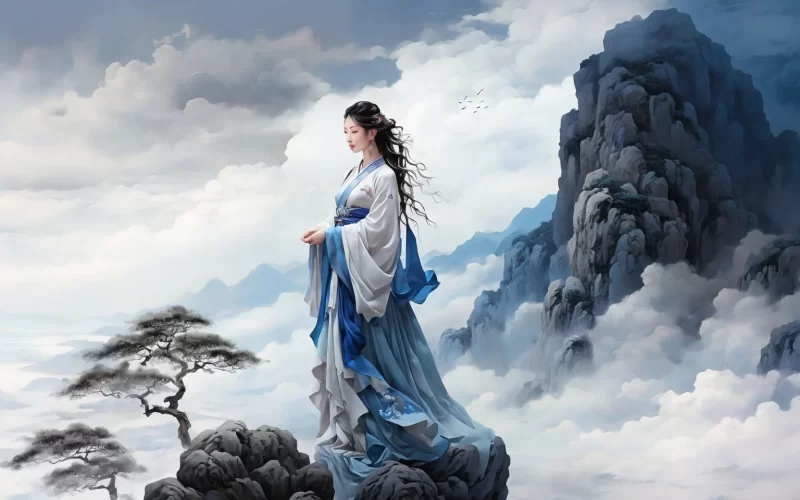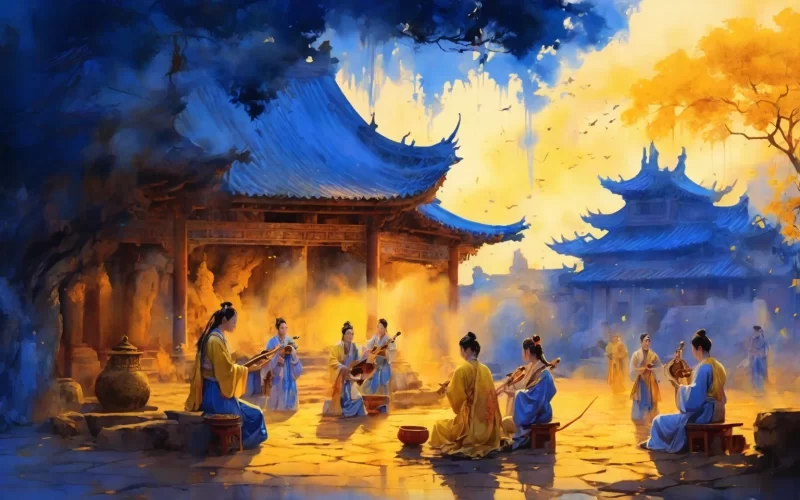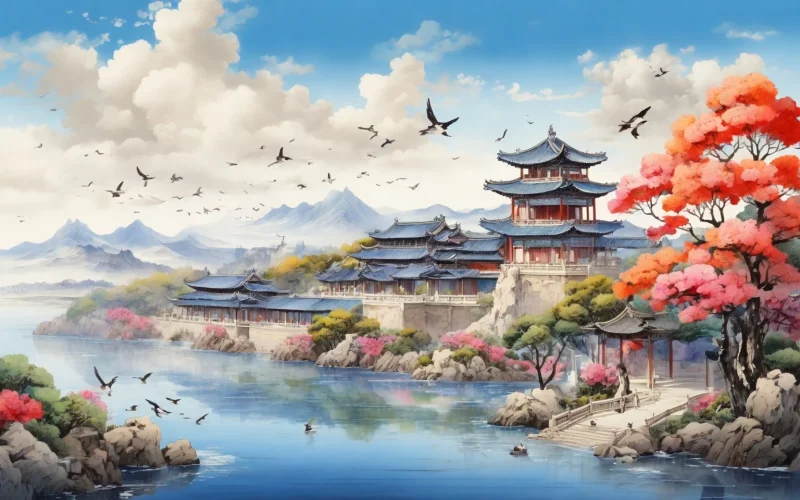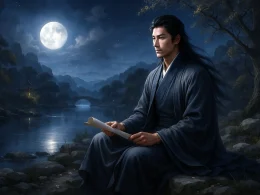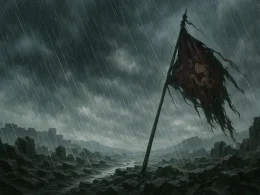Waiting for him alone
Where the river goes by,
She turns into a stone
Gazing with longing eye.
Original Poem
「望夫石」
王建
望夫处,江悠悠。
化为石,不回头。
山头日日风复雨。
行人归来石应语。
Interpretation
This poem was composed by Wang Jian during his residence in Wuchang, inspired by the local folktale of the "Waiting-for-Husband Stone." Legend tells of a woman who waited so long for her traveling husband that she turned into a riverside stone, forever gazing forward. Through this poignant tale, the poet immortalizes ancient women's unwavering devotion, capturing both their steadfast vigil and endless longing, while expressing deep sympathy for their fates. Though brief, the poem resonates with profound meaning, blending scene and emotion in lyrical folkloric beauty.
First Couplet: "望夫处,江悠悠。"
Wàng fū chù, jiāng yōu yōu.
"At her husband-watching post, / The river flows endless, lost."
The opening establishes setting: "husband-watching post" implies perpetual waiting, while "endless river" visualizes both time's passage and boundless sorrow. The juxtaposition of static rock and flowing water creates emotional texture for the woman's solitude.
Second Couplet: "化为石,不回头。"
Huà wéi shí, bù huí tóu.
"Petrified into stone, / Never turning alone."
Personification transforms the faithful wife into geological permanence. "Never turning" doubly signifies the stone's fixed gaze and her unyielding loyalty, merging human emotion with natural form in breathtaking pathos.
Third Couplet: "山头日日风复雨。"
Shān tóu rì rì fēng fù yǔ.
"Winds and rains daily sweep the peak."
Nature's relentless cycles mirror her enduring suffering. The repetitive "daily" (日日) and alternating "winds and rains" (风复雨) rhythmically evoke eternity's harshness upon her stony vigil.
Fourth Couplet: "行人归来石应语。"
Xíng rén guī lái shí yīng yǔ.
"Should her traveler return one day, / The stone would find words to say."
The conclusion elevates realism into magical imagination—the mute stone would speak if reunited with its beloved. This romantic metamorphosis from silence to potential speech crystallizes undying emotional truth.
Holistic Appreciation
In just twenty characters, the poem achieves extraordinary emotional depth. Centering on the stone motif, Wang Jian animates mineral stillness with human devotion. The structure progresses tautly: from establishing place, to petrification, to weathering, culminating in imagined speech—each line compounding mythic and emotional resonance. Through folkloric lens, the poet ennobles ancient women's silent sacrifices, their love immortalized beyond flesh.
Artistic Merits
The poem's greatest artistic merit lies in its "embodying emotion through objects" and "perfect fusion of feeling and scene." Using the static "stone" of nature to express profound human emotions, the poet masterfully employs personification, symbolism, and contrast: animating the stone with human qualities to contain unspoken longing within its silence; juxtaposing the river's "endless flow" with the watcher's "motionless vigil" to create dynamic tension; while the romanticized notion that "the stone would speak" elevates the waiting wife's emotion into an undying faith, producing powerful emotional resonance. These artistic techniques allow this brief poem to contain immense emotional depth within its concise form.
Insights
More than mythic retelling, this poem consecrates love's perseverance against time's erosion. The stone-woman's silent vigil speaks across centuries, challenging modern relationships' ephemerality. Wang Jian's genius lies in making geological patience a mirror for spiritual constancy—where even rocks might weep if love returned. In an age of disposable connections, this petrified fidelity reminds us true devotion outlasts all weathering.
Poem translator
Xu Yuanchong (许渊冲)
About the poet
Wang Jian (王建) was a native of Xuchang, Henan Province, circa 766 - 830 AD. He was admitted as a scholar in 775 AD. He was poor all his life, so he had wider contact with the society and understood the people's situation. His lefu poems reflecting the reality are broad in subject matter and have a certain depth of thought.






